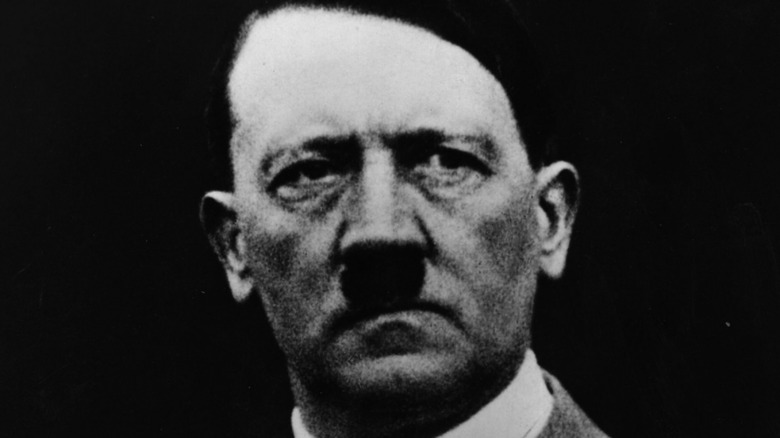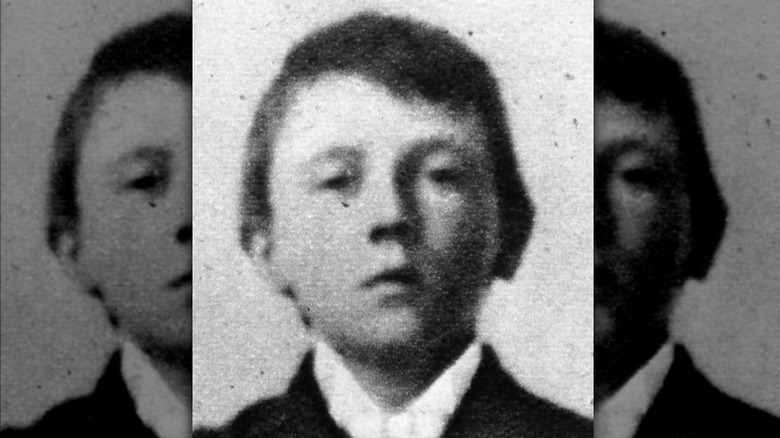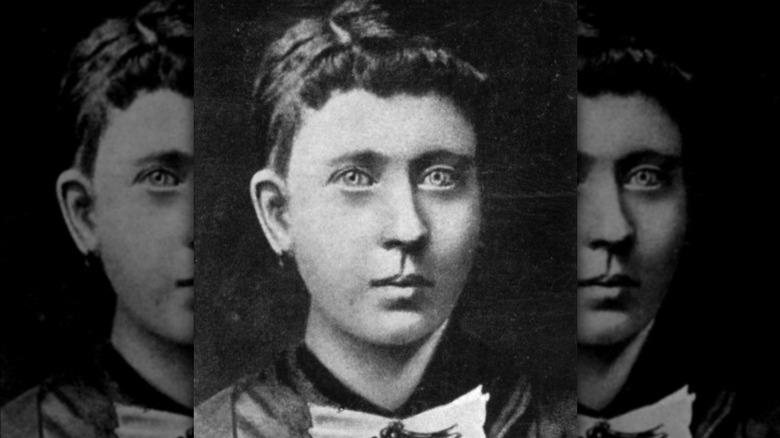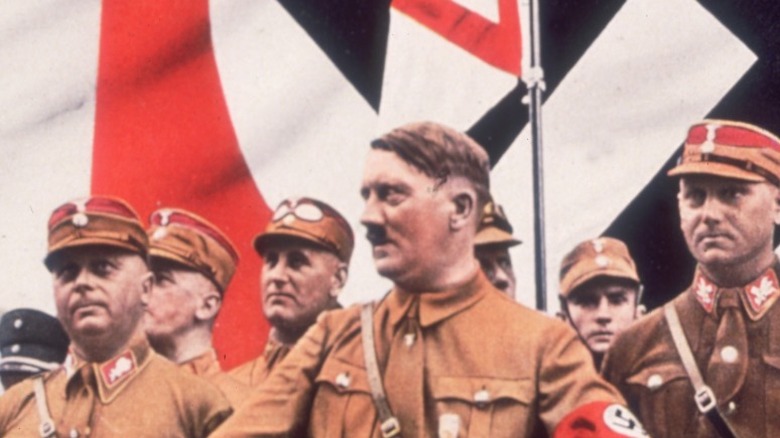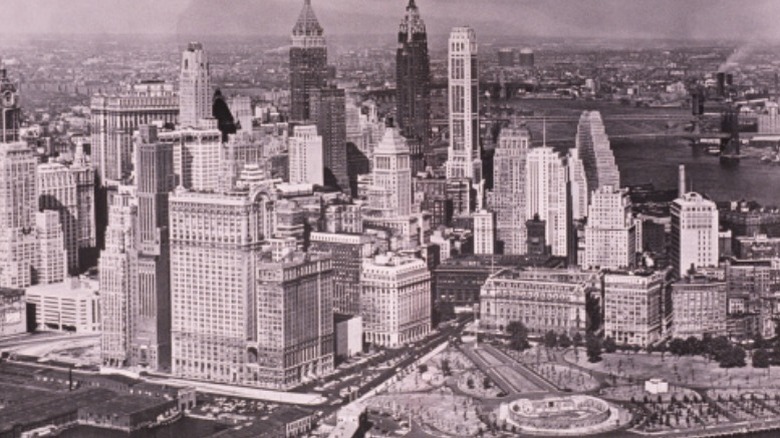Who Was Dr. Eduard Bloch, Adolf Hitler's Jewish Physician?
Decades before Adolph Hitler rose to power in Germany, he was living with his widowed mother in poverty in the small city of Linz, Austria (per War Documentary). His father, Alois, died when Hitler was 13, leaving his mother to tend to her children all on her own. Within several years of his father's death, the Hitler household would become acquainted with a Jewish physician that had recently opened his medical practice in Hitler's hometown.
Like many Jewish people in Linz, Dr. Eduard Bloch had been assimilated into the gentile culture. His compassion and work ethic would combine to make him a success in his field. And his early relationship with Hitler may well have saved his life.
As history played out, Hitler would become the single most destructive force against the Jewish people in world history. Conservative estimates put the death toll of Jews at six million during his time in power (per Jewish Virtual Library). Many more fled their homes to escape the Nazi reign of terror, never to return. Years after Bloch had last treated the Hitler family with medical care, he was witnessing firsthand a genocide in the making that was being orchestrated by one of his former patients. He would later remark that he hoped "Hitler could at least see something good in one member of my race" (per Lit Hub).
Dr. Eduard Bloch began his practice of medicine in Austria
Dr. Eduard Bloch earned his degree in medicine in Prague before giving his time to the Austrian military. While in the service, Bloch would be commissioned as a medical officer until his duties were concluded. After he left the Austrian military in 1901, Bloch settled in Linz and started his medical practice. He soon married Emilie Kafka and began a family (via Spartacus Education).
Jewage mentions that Bloch was well respected in Linz as a physician. The publication notes that Ernst Koref, a former mayor of Linz, would remark on how Bloch would make his professional services available most any time of night. He was especially admired by the poorest of families in his community, as they might not have been able to get medical treatment without his care and compassion.
Author Meriel Schindler writes in her book "The Lost Café Schindler: One Family, Two Wars, and the Search for Truth" of Bloch's own words about his practice that were taken from his memoir. On patient care, Bloch had remarked, "I never made the slightest distinction between the treatment of rich and poor. I answered the call of every sick person, even in the coldest of nights, so that my constant readiness to help became almost proverbial" (via Lit Hub).
Bloch remarked how close Hitler was to his mother
The first family member of the Hitler household to be under Dr. Eduard Bloch's care was Adolph Hitler himself. Bloch examined the teenage Hitler, who had been complaining about a lung ailment in 1904 (via Jewage). Over the next several years, Bloch got to know the family a bit and would later give plenty of remarks on the impression Hitler had left on him when the aspiring artist was still a student. Bloch would write a guest column in 1941 for Collier's Weekly in which he gave the world a description of the Nazi leader they might not have been expecting. Bloch remarked, "As a youth, he (Hitler) was quiet, well mannered and neatly dressed" (per Spartacus Educational).
Bloch would also remark on Hitler's closeness with his mother. In that same Collier's Weekly article, Bloch penned, "While Hitler was not a mother's boy in the usual sense, I have never witnessed a closer attachment. This love had been mutual. Klara Hitler adored her son. She allowed him his own way whenever possible."
Bloch showed a great deal of kindness to the Hitler family, as he knew that they were suffering financially after the death of Hitler's father several years earlier. Jewage reports how Bloch would give the family medical treatment at a large discount and would sometimes not charge them for his services as he knew that money was tight. Time would later tell that these acts of kindness and mercy were not going to be forgotten by Hitler after he rose to power.
Bloch tended to Klara Hitler when she had cancer
One day, Adolph Hitler's mother arrived at Dr. Eduard Bloch's office seriously ill. According to Spartacus Educational, Klara Hitler told Bloch of severe pain in her chest. It had been bothering her for some time, but her duties in the household had not given her the time to get examined. She also felt that the pain might go away on its own, but that it had finally become too much to bear.
Bloch examined her and determined that she had developed a tumor on her breast. In February 1907, an operation was performed to remove the growth. Klara had kept her condition a secret from her son for as long as she could, but could not withhold her prognosis forever. Bloch sat down with Hitler and informed him that the surgery was not as successful as he had hoped and that his mother's cancer had spread to other places.
Bloch treated Klara the best he could with the knowledge that was available at the turn of the 20th century. In the end, she was given injections of morphine to help stave off the pain. Bloch would later comment that during this ordeal, Hitler remained close to his mother's side. "He slept in the tiny bedroom adjoining that of his mother so that he could be summoned at any time during the night," he said. "During the day he hovered about the large bed in which she lay." Klara Hitler died on December 21, 1907.
Hitler gave special protections to Bloch
The life of a Jewish family under Nazi rule was one of terrifying uncertainty. The ripples of anti-Semitism that had been washing over Europe for centuries were now becoming waves of hatred controlled by the Nazi propaganda machine. As the Germans annexed Austria, Jewish people there were finding themselves stripped of fundamental rights and had their assets seized. World Jewish Congress tells us that of the nearly 200,000 Jews living in Austria at the time of annexation in 1938, only 5,000 remained there by 1942. The lucky ones were able to flee under the radar, while others were sent into ghettos and later work or death camps.
But Dr. Eduard Bloch would not suffer the same fate as his fellow Jews. Spartacus Educational reports that Bloch wrote to Adolph Hitler asking for help, and the dictator obliged. Hitler gave orders that his former family doctor was to be placed under special protection by the Gestapo in Austria, shielding Bloch from an uncertain fate. Hitler remarked, "Dr. Bloch is an Edeljude — a noble Jew. If all Jews were like him, there would be no Jewish question."
Bloch and his wife were allowed to live in their home in Linz without any disturbances from the invading Nazi forces. The couple was also free to travel, with Hitler allowing their passports to be continually renewed. At one point, the Blochs were also allowed to house fellow Jews who had been displaced by the Nazi occupation.
Bloch was allowed to flee Austria for New York City
Perhaps Dr. Eduard Bloch knew that Europe was about to be torn asunder in the coming years, or maybe he felt as though his protected status wouldn't be permanent. Whatever the reason, Bloch and his wife put their home in Austria up for sale and made plans to head over the Atlantic to the United States. Bloch used his privileges and was able to do what no other Jews in his country could; sell his home for fair market value (per Jewage).
Spartacus Educational reports that the doctor received personal permission from Adolph Hitler to leave Linz and move to New York City. The Blochs settled in the Bronx, but the good doctor was not able to resume a medical practice in his new home. The medical degree he received in Prague was not recognized in the U.S., putting an end to the medical career he had spent his entire life building.
Once safely in Allied territory, Bloch would sit down for two separate interviews with the Office of Strategic Services (which would later develop into the CIA). The U.S. government was keen on getting any and all information about Hitler as possible and felt that Bloch could give his new country much-needed insight into Hitler's childhood.
Bloch lived long enough to see Allied victory in Europe. He was stricken with stomach cancer, succumbing to the condition on June 1, 1945. He was interred at Beth David Cemetery in Elmont, New York.
